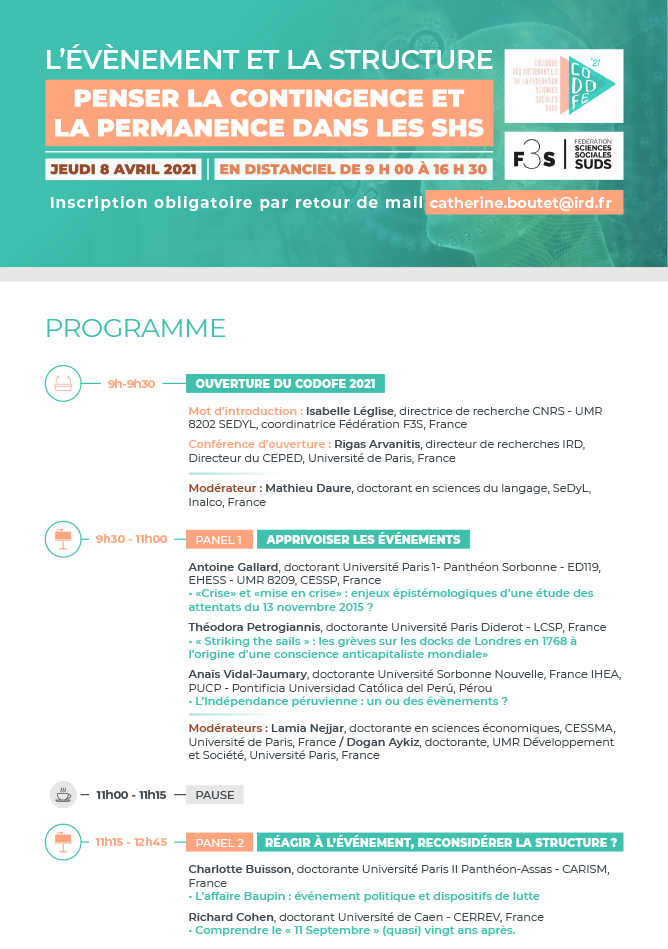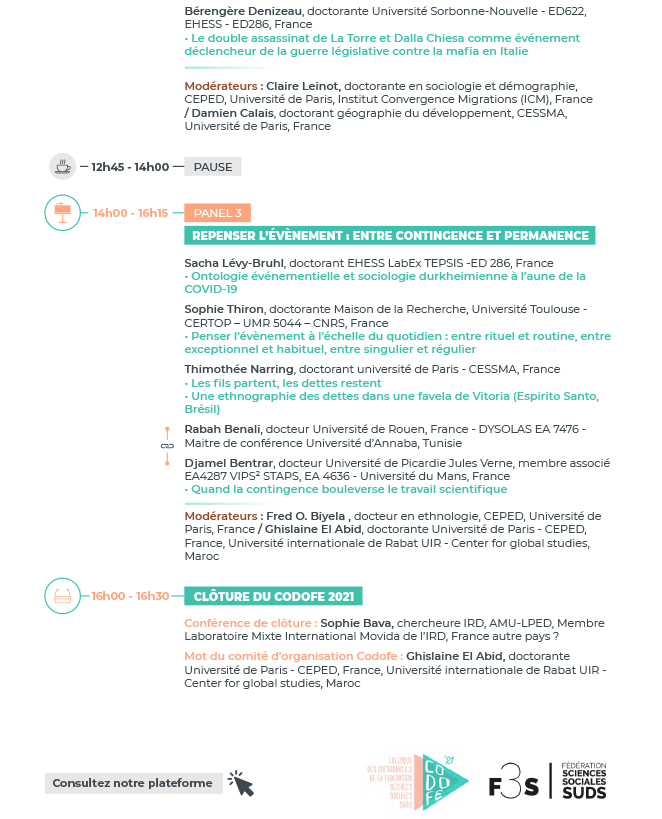08 April 2021
The event and the structure: Thinking about contingency and permanence in SHSs
By videoconference – Registration required by email:


>> Download the CODOFE 2021 program (Fr)
Fernand Braudel, in his magnificent book on the Mediterranean at the time of Philip II, points out that one event, that of the battle of Lepanto (near the isthmus of Corinth in Greece) on 7 October 1571, was of capital importance in the history of Europe. Braudel explains that, contrary to his own theorization of the long period in history, he almost apologizes for having to deal with events. He points out the importance of this battle in the social and geostrategic equilibrium of sixteenth-century Europe. The natural sciences seem less cautious when thinking about the role of events: the Big Bang is only an event but it created our universe. Many examples show that events such as an epidemic, an accident, a scientific discovery, the political choice of an influential person or a whistleblower can lead to a real bifurcation in both historical and social trajectories.
The importance of events, as opposed to long-term changes or social permanence, has occupied social science in a variety of ways and in a large number of disciplines. It concerns the articulation between the contingent and the structural, between the moment and the long term periods, between the individual and the collective, between the particular and the universal. It also refers to the way in which natural and social resources combine in social organization. The event produces new arrangements, reveals new hierarchies, reveals trajectories left on the margins. It is not surprising, moreover, that during the COVID-19 epidemic, these questions resurface in the various fields of work carried out within our research units.
If these questions seem philosophical or epistemological, thinking about the event can be very useful in our work. Indeed, in our fieldwork, in the social sciences, or when analyzing our data, we encounter these aspects that oblige us to think about the temporal and spatial, but also “structural” articulation between social permanence and changes induced by sudden events. At the very moment of writing a thesis (or even a more modest article), when we have to think about ordering the explanations and giving meaning to our data, these questions inevitably appear.
The CODOFE wants to open up these questions, obviously inspired by our recent exceptional experience with the COVID-19 epidemic, but also by thinking in a general way about this articulation between the event and the social structure based on our empirical work.
In this perspective, the Call for Papers concerns all disciplines of the human and social sciences.
Practical details
This F3S Doctoral Student Symposium will take place in the spring of 2021, April 8, 2021.
Oral presentations of the papers will be followed by discussion time.
Doctoral students wishing to participate in this CODOFE are invited to submit a proposal of 500 words maximum (title, abstract, references – 4 maximum – and keywords – 4 maximum – included) summarizing the subject of their paper.
The languages of the colloquium will be French and English. Proposals for papers must be written in the language foreseen for the paper.
The participants will be selected, after the opinion of the scientific committee, on the basis of the abstracts which must include a title, the name of the author and his or her institution, and the material on which the proposal is based.
These abstracts will be sent by November 13, 2020 to .
A notification of acceptance will be sent to you in mid-December 2020. It will specify the terms and conditions for registration to CODOFE 2021.
Presentation of the F3S
The Federation of Southern Social Sciences (F3S) was formed in 2012, on the initiative of human and social science laboratories dedicated to the study of societies in the Global South – understood as developing or emerging countries. It brings together Parisian laboratories under the supervision of IRD: the Centre Population et Développement (Ceped), the Centre d’Etudes en Sciences Sociales sur les Mondes Africains, Américains et Asiatiques (CESSMA),
Patrimoines Locaux, environnement et mondialisation (PALOC), the Unité de Recherche Migrations et Société (URMIS) and SeDyL – Structure et Dynamique des langues.
The Centre de Recherche et de Documentation sur les Amériques (CREDA) is associated with it. The F3S brings together these six laboratories in order to exchange on shared questions and themes and to promote disciplinary, thematic and geographical cross-fertilization on research topics and questions of major importance for the South and on a global scale.
Steering Committee
- Fred O. Biyela, Doctor in Anthropology, CEPED, University of Paris
- Catherine Boutet, head of the scientific information and animation pole (PIAS), CEPED, IRD, University of Paris Descartes
- Damien Calais, doctoral student in development geography, CESSMA, University of Paris
- Arsène Camara, Doctor in History, Societies and Civilizations, CESSMA, INALCO, University Sonfonia Conakry
- Mathieu Daure, doctoral student in language sciences, SeDyL, INALCO
- Ghislaine El Abid, doctoral student in sociology, CEPED, University of Paris
- Claire Leinot, doctoral student in sociology and demography, CEPED, University of Paris, Institut Convergence Migrations (ICM)
- Lamia Nejjar doctoral student in economics, CESSMA, University of Paris
Scientific Committee
- Giulia Bonacci (IRD, URMIS, University of Côte d’Azur)
- Tarik Dahou (IRD, PALOC, University of Paris Descartes)
- Pascale De Robert (UMR PALOC, IRD/MNHN, University of Paris)
- Christian Girault (CNRS, CREDA – IHEAL, University Sorbonne Nouvelle)
- Mina Kleiche – Dray (IRD, CEPED, University de Paris)
- Claire Médard (IRD, URMIS, University of Paris Diderot)
- Jean- Baptiste Meyer (IRD, CEPED, University of Paris)
- Santiago Sanchez Moreano (SeDyL-LABEX EFL, University of Paris)
- Valelia Muni Toke (IRD, SeDyL, University of Paris)
- Jean Rivelois (IRD, CESSMA)
- Robert Ziavoula (CESSMA, INALCO)

